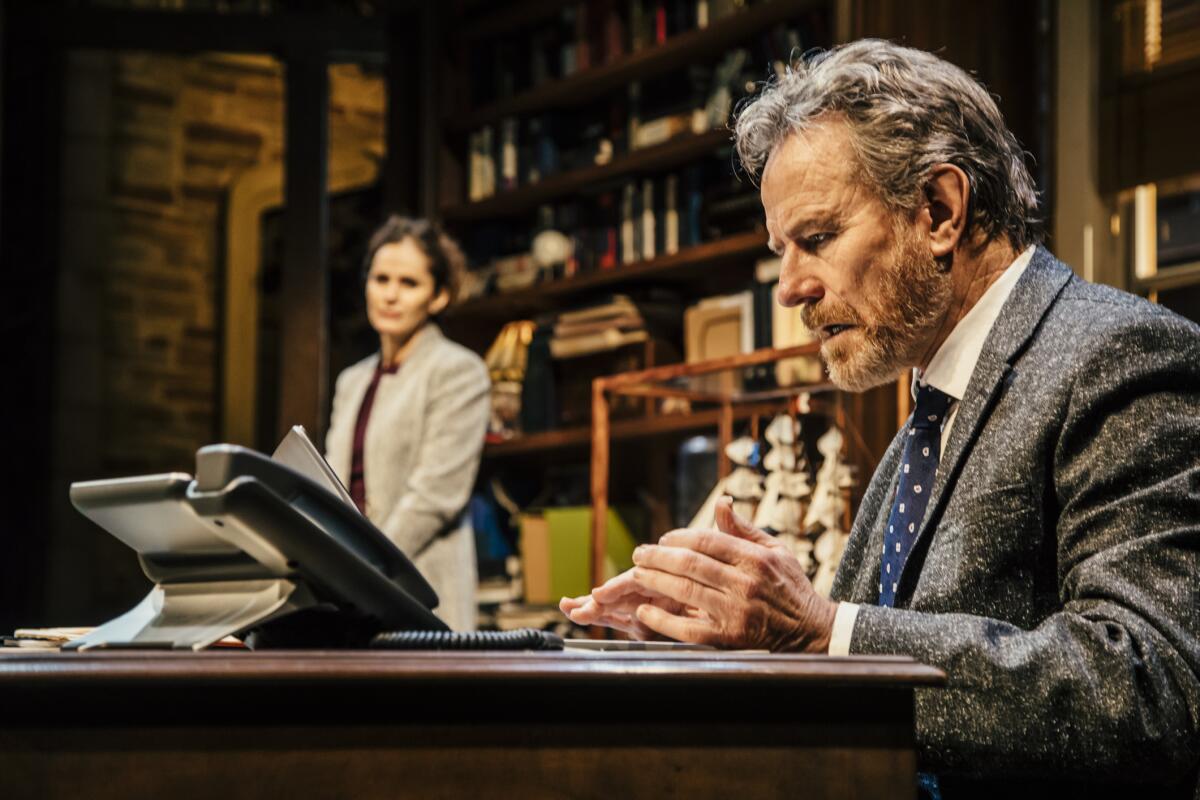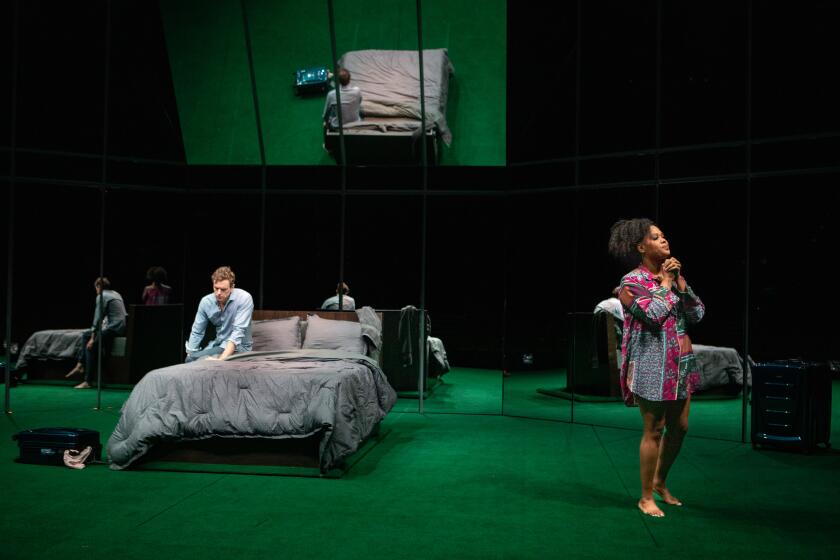Bryan Cranston tests the bounds of free speech in ‘Power of Sail’ at the Geffen Playhouse

- Share via
Bryan Cranston slips into his characters skin-first. As Walter White in “Breaking Bad,” he never lost touch with the ravaged health that was driving this married chemistry teacher into acts of criminal desperation.
In his Tony Award-winning performance as Lyndon B. Johnson in “All the Way,” Cranston brought the president’s vote-wrangling power to life with a Texas drawl, cocky slouch and inexhaustible lung power. As Howard Beale in the stage version of “Network,” he won another Tony for delivering an on-air nervous breakdown that was so visceral it’s amazing no one in the audience called 911.
For the record:
3:36 p.m. Feb. 22, 2022An earlier version of this story misspelled actor Hugo Armstrong’s name as Hugh.
Playing Charles Nichols in Paul Grellong’s “Power of Sail,” which opened Thursday at the Geffen Playhouse, Cranston embodies the weary petulance of a grizzled Harvard history professor whose star is in decline. In registering the character’s contempt at anyone who would question his progressive bona fides, he takes on the character’s niggling aches and pain.
While waiting for a delayed Amtrak with one of his graduate students, he massages a bad knee — an arthritic reminder that time stops for no one. These little physical details, incidental yet evocative, create a portrait that’s capable of distilling an entire personality in the neat trim of an academic’s beard.
The actor takes on the role of a Harvard professor under fire for inviting a white nationalist to speak on campus in a production opening this week at the Geffen Playhouse.
Unfortunately, while Cranston is painting in oils, his playwright is diagramming in stick figures. “Power of Sail,” a debate play on the hot topics of free speech and academic freedom, is something a cable news network looking to get into scripted television drama might dream up.
The production, under the direction of Weyni Mengesha, wastes an enviable cast (that includes Amy Brenneman) on a play that’s part position paper, part political mystery. Rachel Myers’ set conjures an Ivy League dream of book-lined shelves and Gothic archways, but the dramatic world is built on shadows.
Charles, a free-speech absolutist whose politics are more aligned with Rachel Maddow than with Tucker Carlson, has invited to campus a 31-year-old Nazi sympathizer and Holocaust denier named Carver. Students are loudly protesting on campus, but Charles refuses to back down.
He sees the symposium as a statement. Universities shouldn’t be in the business of coddling. Extremists ought to be exposed, and Charles promises a “full dismantling.”
Amy (Brenneman), his worried dean in full damage control mode, reminds him that Carver “cozies up to Klansmen.” She shows Charles the Boston Globe op-ed that calls him a neo-Nazi “apologist” and strongly urges him to reconsider giving a prestigious platform to a purveyor of hate.
But as Charles unbudgingly argues, “The answer to hate speech is more speech.” He regularly whips out this slogan whenever he needs a shield — a sign that his motivation may not be as straightforward as it seems.
Having planted this clue, Grellong might be expected to probe deeply into Charles’ character. Instead, he ushers in other points of view while setting up a tangled web of intrigue.
The other characters are all pawns in an argument presented from different angles. Complexity is the goal, but the drama is too manipulative to be enlightening.
Baxter (Brandon Scott), a Black historian who was groomed by Charles and has now surpassed him in cultural prominence, shows up unannounced to try to stop him from sabotaging his reputation. He argues not only from the standpoint of friendship but also from the broader principle that not everyone deserves a place at “the table where the grown-ups are talking.”
Lucas (Seth Numrich) and Maggie (Tedra Millan), two grad students vying for the same Harvard fellowship that launched Baxter’s career, are aligned in wanting to help their professor out of this mess. Coming from opposite ends of the political spectrum, however, they have different agendas.
Maggie wants Charles to attend a “safe space meet” with outraged students who have drawn her sympathy. Lucas, who makes throwaway remarks about being a “cis white male” at an elite institution, is cagier — and more in control than his skittish demeanor lets on.
Charles invites these students to accompany him to a planning dinner with Carver at his white nationalist compound. But only Lucas, who’s always looking to exploit an opportunity for advancement, agrees to join him on a visit that will have shocking consequences.
“Power of Sail” moves backward in time to account for how events disastrously conspired. The characters, at the service of an increasingly convoluted plot, must hang on for dear life. Not everyone makes it.
Even with all her veteran wiles, Brenneman can’t make Amy, an academic institutionalist who acts more like a public relations executive, believable. When she swats a stack of books onto the floor in a standoff with Maggie, who has improbably decided to take justice into her own hands, it’s as though her character has been demoted to melodrama.
Scott’s Baxter is meant to be the rationalist in a sea of frothing fanatics, but he comes off as a cipher. Implausibly popping up at the behest of the playwright, he has a postcrisis confrontation with a drunk and desperate Charles that only exposes the dramatic emptiness of their relationship.
“Slave Play,” which confronts America’s race problem through depiction of experimental sex therapy, is a controversial work making its West Coast debut.
Two other characters contribute to the distraction. Donna Simone Johnson plays an FBI agent whose pauses are all pregnant and whose nods are consistently knowing. And in the most thankless role, Hugo Armstrong is granted an aimless scene as a bartender whose main characteristic is telling the world’s most feeble jokes.
The logistics of the uncovered plot are as strained as the psychological explanation of Charles’ behavior. Apparently, he’s dying of envy of colleagues who have become MSNBC regulars.
Academic jealousy is not something that should ever be underestimated. But this is a TV writer’s idea of a premier university. Grellong, who has written for “Hawaii Five-O” and “Law & Order: Special Victims Unit,” manufactures a caricature of Harvard in which all anyone seems to care about is getting on “The Rachel Maddow Show.”
The most interesting character — which isn’t to say the most credible — is Lucas, whose unlikely research (a running gag) is on the “agrarian economy and practices of 17th century Sweden.” It’s not his scholarship but his right-wing long game that reenergizes this sluggish play.
Numrich is an excellent actor, so I wish the role would have better packaged his deviousness. The scene on the train platform, in which Lucas slyly entices Charles to indulge in some white pride, is disturbingly fresh. But all subtlety is lost when this J.D. Vance knockoff takes off his mask.
It goes without saying that Cranston fleshes out every moment of stage time with truth. But why he’d settle for “Power of Sail” is a mystery. (The baffling title, derived from nautical law, is deterrent enough.) The stage should offer Cranston an opportunity to stretch his gifts. This play leaves him high and dry.
'Power of Sail'
Where: Geffen Playhouse, 10886 Le Conte Ave., Los Angeles
When: 8 p.m. Tuesdays-Fridays, 3 and 8 p.m. Saturdays, 2 and 7 p.m. Sundays. Ends March 27.
Tickets: $39-$149
Info: (310) 208-2028 or geffenplayhouse.org
Running time: 1 hour, 45 minutes (no intermission)
COVID protocol: Proof of full vaccination is required. Masks are required at all times.
More to Read
The biggest entertainment stories
Get our big stories about Hollywood, film, television, music, arts, culture and more right in your inbox as soon as they publish.
You may occasionally receive promotional content from the Los Angeles Times.













